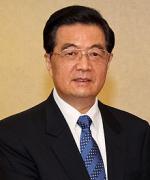Disable ads!
Hu Jintao
This article contains Chinese text. Without proper rendering support, you may see question marks, boxes, or other symbols instead of Chinese characters. Hu Jintao Simplified Chinese 胡锦涛 Traditional Chinese 胡錦濤 Transcriptions Mandarin Hanyu Pinyin Hú Jǐntāo Hu Jintao (pinyin: Hú Jǐntāo, pronounced [xu tɕi ntʰɑ ʊ]; born 21 December 1942) was the paramount leader of China between 2002 and 2012.[note 1] He held the offices of General Secretary of the Communist Party, President of the People's Republic and Chairman of the Central Military Commission. He was a member of the 14th to 17th CPC Politburo Standing Committee, China's de facto top decision-making body. Hu has participated in the Communist party bureaucracy for most of his career, notably as Party secretary for Guizhou province and the Tibet Autonomous Region, and then later First secretary of the Central Secretariat and Vice-President under former leader Jiang Zemin. Hu is the first leader of the Communist Party without any significant revolutionary credentials. As such, his rise to the leadership represented China's transition of leadership from establishment communists to younger, more pragmatic technocrats.[citation needed] During his term in office, Hu reintroduced state control in some sectors of the economy that were relaxed by the previous administration, and has been conservative with political reforms. Along with his colleague, Premier Wen Jiabao, Hu presided over nearly a decade of consistent economic growth and development that cemented China as a major world power. He sought to improve socio-economic equality domestically through the Scientific Development Concept, which aimed to build a "Harmonious Socialist Society" that was prosperous and free of social conflict. Meanwhile, Hu followed conservative policies on China politically, cracking down on social disturbances, ethnic minority protests, and dissident figures. On foreign policy, Hu advocated for "China's peaceful development", pursuing soft power in international relations and a corporate approach to diplomacy. Through Hu's tenure, China's influence in Africa, Latin America, and other developing regions has increased. Hu possessed a low-key and reserved leadership style. His tenure was characterized by collective leadership and consensus-based rule. These traits made Hu a rather unknown figure in the public eye, embodying the focus in Chinese politics on technocratic competence rather than persona. Hu retired in 2013. He was succeeded by Xi Jinping.
 Read more on wikipedia.org Read more on wikipedia.org
 All quotes by Hu Jintao All quotes by Hu Jintao
 Edit Edit
|

|
|
|
|
|
Background photo by Giuliana
|